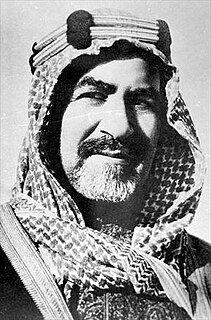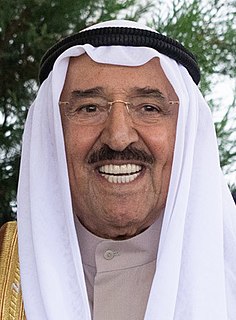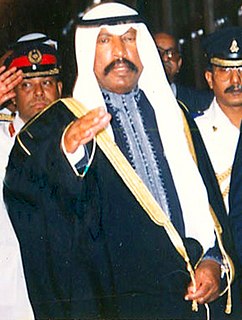| |||||
| Decades: | |||||
|---|---|---|---|---|---|
| See also: | Other events of 1991 List of years in Kuwait Timeline of Kuwaiti history | ||||
Events from the year 1991 in Kuwait .
| |||||
| Decades: | |||||
|---|---|---|---|---|---|
| See also: | Other events of 1991 List of years in Kuwait Timeline of Kuwaiti history | ||||
Events from the year 1991 in Kuwait .
January to March
April to June
This section is empty.You can help by adding to it.(March 2015) |
July to September
This section is empty.You can help by adding to it.(March 2015) |
October to December
This section is empty.You can help by adding to it.(March 2015) |
Kuwait is a country in the Arabian Peninsula, surrounding the Gulf of Kuwait at the head of the Persian Gulf. In the eighteenth and nineteenth centuries, Kuwait was a prosperous trade port.

The Kuwait Military Forces consist of several joint forming defense forces. The governing bodies are the Kuwait Ministry of Defense, the Kuwait Ministry of Interior, the Kuwait National Guard and the Kuwait Fire Service Directorate. The Emir of Kuwait is the commander-in-chief of all defense forces and the Crown Prince is the deputy commander.

Kuwait City is the capital and largest city of Kuwait. Located at the heart of the country on the south shore of Kuwait Bay on the Persian Gulf, it is the political, cultural and economical centre of the emirate, containing Kuwait's National Assembly (parliament), most government offices, the headquarters of most Kuwaiti corporations and banks.

The House of Al Sabah is the ruling family of Kuwait.

The Emir of the State of Kuwait is the monarch, head of state and head of government of Kuwait, the country's most powerful office. The emirs of Kuwait are members of the Al-Sabah dynasty, which originate from the Bani Utbah; a federation of clans in the Arabian Peninsula.

Sheikh Jaber al-Ahmad al-Sabah of the al-Sabah dynasty was the Emir of Kuwait and Commander of the military of Kuwait who served in the posts from 31 December 1977 until his death on 15 January 2006 due to cerebral hemorrhage. The third monarch to rule Kuwait since its independence from Britain, Jaber had previously served as minister of finance and economy from 1962 to 1965 when he was appointed prime minister prior to becoming Kuwait's ruler.

Nawaf Al-Ahmad Al-Jaber Al-Sabah is the Emir of Kuwait and the Commander of the Kuwait Military Forces. On 30 September 2020, he succeeded to the throne following the death of his half-brother, Sabah Al-Ahmad Al-Jaber Al-Sabah. Nawaf had been nominated as Crown Prince on 7 February 2006.

Nasser Mohammed Ahmad Al-Jaber Al-Sabah is a Kuwaiti politician who served as Prime Minister of Kuwait from 7 February 2006 until resigning on 28 November 2011. He is the first prime minister to date that never became ruler or even crown prince.

Kuwait, officially the State of Kuwait, is a country in Western Asia. Situated in the northern edge of Eastern Arabia at the tip of the Persian Gulf, it borders Iraq to the north and Saudi Arabia to the south. As of 2016, Kuwait has a population of 4.5 million people: 1.3 million are Kuwaitis and 3.2 million are expatriates. Expatriates account for approximately 70% of the population.

Sheikh Jaber Al-Mubarak Al-Hamad Al-Sabah is a Kuwaiti royal and former politician who was the Prime Minister of Kuwait from 2011 to 2019. Previously he served as minister of defense as well as deputy prime minister.

Ahmad Al-Jaber Al-Sabah was the tenth ruler of Kuwait, from 29 March 1921 until his death on 29 January 1950.

Sabah al-Ahmad al-Jaber al-Sabah was the Emir of Kuwait and the Commander of the Kuwait Military Forces from 29 January 2006 until his death. He was the fourth son of Sheikh Ahmad Al-Jaber Al-Sabah.

Sheikh Saad Al-Abdullah Al-Salim Al-Sabah was the Emir of Kuwait and Commander of the Military of Kuwait during a short reign of nine days, succeeding Sheikh Jaber. Sheikh Saad was a general commander in the Military of Kuwait; in addition, the first to head the Kuwaiti Ministry of Interior until 16 February 1978 and the first military officer to head the Ministry of Defense since 1964.
Ahmad Al Khaled Al Sabah is a Kuwaiti politician and the former lieutenant general in the Kuwaiti Armed Forces. He served as deputy prime minister and minister of defense of Kuwait from 2012 to 2013.
The Kuwait 25th Commando Brigade of the State of Kuwait, commonly known as the 25th Commando, is one of Kuwait's various principal Commando brigades. The 25th Commando operates at the disposition of the respective commander who reports to the respective leadership of the Military of Kuwait; executing, participating, supporting, and carrying all conflicts in which the Military of Kuwait engaged since inception in 1960. The 25th Commando executes general operations in support of the Military of Kuwait.

The 23rd Arabian Gulf Cup was the 23rd edition of the biennial football competition for the eight members of the Arab Gulf Cup Football Federation. It took place in Kuwait from 22 December 2017 until 5 January 2018. Oman won their second title, defeating the United Arab Emirates in the final on penalties following a goalless draw.
The following lists events that happened during 2003 in Kuwait.
Events from the year 1990 in Kuwait.

Kuwait–Mexico relations refers to the diplomatic relations between Kuwait and Mexico. Both nations are members of the United Nations.
The timeline of the Gulf War details the dates of the major events of the 1990–1991 war. It began with the Iraqi invasion of Kuwait on 2 August 1990 and ended with the Liberation of Kuwait by Coalition forces. Iraq subsequently agreed to the United Nations' demands on 28 February 1991. The ground war officially concluded with the signing of the armistice on 11 April 1991. However, the official end to Operation Desert Storm did not occur until sometime between 1996 - 1998. Major events in the aftermath include anti-Saddam Hussein uprisings in Iraq, massacres against the Kurds by the regime, Iraq formally recognizing the sovereignty of Kuwait in 1994, and eventually ending its cooperation with the United Nations Special Commission in 1998.
| This Kuwait-related article is a stub. You can help Wikipedia by expanding it. |
| This Middle Eastern history-related article is a stub. You can help Wikipedia by expanding it. |
| This year in Asia article is a stub. You can help Wikipedia by expanding it. |